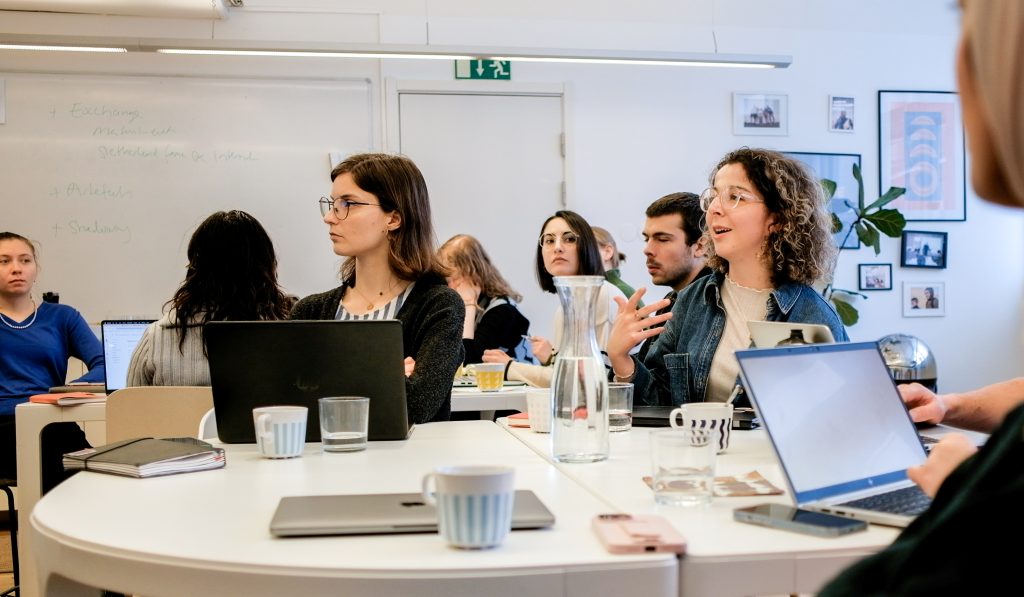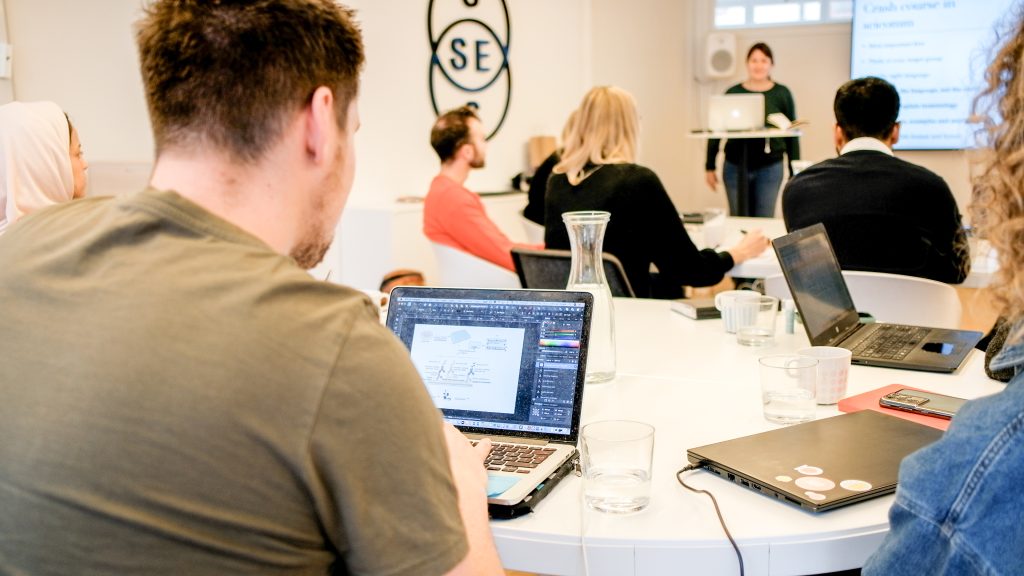Your PhD Doesn’t Have to Be a Solo Journey
Did you know that you can take courses together with non-KI scholars as a PhD student at KI?
Our university has a long-standing collaboration with an organisation that provides a host of useful courses together with five other universities in Stockholm, called the Stockholm School of Entrepreneurship. As part of my doctoral education, I decided to enrich my skillset by taking some courses and workshops organized by SSES.

One of them was the weekend workshop called Leading and Succeeding in Uncertainty, where I learned about the VUCA model which helped me to evaluate and address stressful aspects of my doctoral journey. I wanted to find out more about our university’s collaboration with SSES, so to do so, I asked SSES HQ about the things I was curious about.
Written by Aleksandra Kanina, PhD student at Karolinska Institutet and participant of the course “Career Skills for Scientists” during the spring term 2023.
| What is SSES? The Stockholm School of Entrepreneurship (SSES) is an academic institution that offers studies in entrepreneurship and innovation to higher education students, alumni, scholars, and educators. As a collaborative initiative, SSES unites six member universities in Stockholm: Karolinska Institutet, Stockholm University, KTH Royal Institute of Technology, Stockholm School of Economics, KMH Royal College of Music, and University of Arts, Crafts and Design (Konstfack). SSES PhD courses and seminars are designed to bring scholars together in a supportive, collaborative environment, where you’ll have the chance to connect with peers who share your interests, exchange ideas, and engage in constructive discussions to enhance your research. The courses are suitable for PhD students from different backgrounds, from science to technology, and completion earns you ECTS credits. Check out the full list of upcoming educational activities in the calendar. Participation in courses and seminars is free of charge. |
What motivated SSES to create courses specifically for PhD students and researchers?
We’ve been providing our interdisciplinary courses to Master’s students for so long, and seeing how well it works and how many benefits there were for them, over time we realised that we had the chance of bringing the same opportunities to PhD students. We also knew from experience that scholars are even more in need of what our cross-university setup provides, because the PhD journey is a terribly isolated one – which isn’t just detrimental to the quality of the research, but possibly devastating for the individual as well.
How is SSES connected to KI? How do these courses benefit KI researchers in the life sciences, for example?
SSES and KI have a strong and long-standing relationship, reflected in the fact that this term, three out of four of our PhD courses are taught by KI educators. This means that the content is not only highly relevant but also closely tied to the cutting-edge research and challenges faced by life science scholars at KI. Take, for instance, the experience of Hanna Jansson, Head of the Unit for Bioentrepreneurship at KI. She has seen first-hand how SSES courses empower researchers to think creatively, bridge disciplines, and develop entrepreneurial mindsets. This partnership has helped KI scholars move beyond traditional academic silos, enabling them to connect their expertise to broader societal needs and even pursue innovative collaborations across industries.
What specific skills or competencies do you teach that you think are the most valuable to PhD students?
All our courses aim to support the learning of what we like to call the three pillars of entrepreneurial education: self-leadership, co-creation, and resource attraction. These are vital to everyone in our experience, but more specifically for PhD students we’ve found that communication and collaboration in the form of reflection and feedback are especially important. All scholars need a structured space to think critically about their work, so that their research isn’t just happening in a vacuum, and that is what our courses offer. This allows them to develop different perspectives, to learn how to listen and reflect, and, crucially, to translate their expertise into meaningful impact – whether that’s within academia, industry, or beyond.
Why should a non-entrepreneurship scholar take PhD courses at SSES?
Entrepreneurial skills aren’t just good for a potential entrepreneur to have – they’re valuable for any career. The things we teach come from the expertise of the entrepreneurial field, yes, but they are adapted to benefit anyone in whatever field they’re in. Every single scholar’s journey is going to require them to be able to lead themselves, to communicate, to collaborate and negotiate, to know their worth, and assess the value of their research – regardless of whether they’re going to stay in academia, start their own business, or go on to work for an existing company.
How can interdisciplinary collaboration at SSES benefit my academic career?
We know that every scholar is an expert at their thing, and we’ve seen how many incredible outcomes can be achieved when different experts from different fields get to meet and collaborate. Not only does an interdisciplinary course provide these meeting points that likely wouldn’t happen otherwise, they also create an easy and instinctive networking environment. So, as a scholar you can gain new perspectives, collaborators, mentors, peers, and colleagues – all in one cross-disciplinary course.
How does SSES foster networking opportunities among PhD students and researchers?
Working as a PhD is often a very lonely endeavour, and it’s easy to feel isolated – even in a lab full of people. By bringing together scholars from six universities and different fields, our courses are built for the kinds of connections that melt this isolation away. Our goal is for the collaboration to happen naturally, by having students work together, share ideas, and learn from each other’s expertise. Many walk away with not just fresh perspectives, but also new collaborators, mentors, and even friends. Networking at SSES isn’t about forced introductions; it’s about creating an environment where connections happen organically.
How are SSES PhD courses tailored to those unsure about choosing a career in industry vs. academia?
Our focus is on applicability – meaning that all our courses and activities aim to strengthen each participant with skills and knowledge that will help them in whatever their career is going to look like. Additionally, social capital is one of the most impactful outcomes of our courses. It’s what enables students to leave not just with skills, but with a network that can support and inspire them throughout their careers. During the courses, we’ve seen that students very often have meaningful and engaging conversations that spark those “Aha!” moments, which usually end up being insights they carry with them long after the course ends. These experiences tend to clarify their career paths and provide the confidence they need to navigate their next steps, whether that’s in academia, industry, or something entirely different.
Which current course are you most proud of?

If we had to pick, the Mastering Science Communication course stands out. It’s a game-changer for researchers who want to secure funding or resources, either to be able to stay in academia or to make an impact with their work in the industry.
If you’re a scientist, knowing how to share your research in a way that makes sense is crucial – whether you’re presenting to a funding committee, engaging with the public, or collaborating across disciplines. However, it’s not just about explaining the science – it’s about inspiring action, building trust, and displaying the real-world value of your research. That is what this course does, and we’re very proud of it.

0 comments